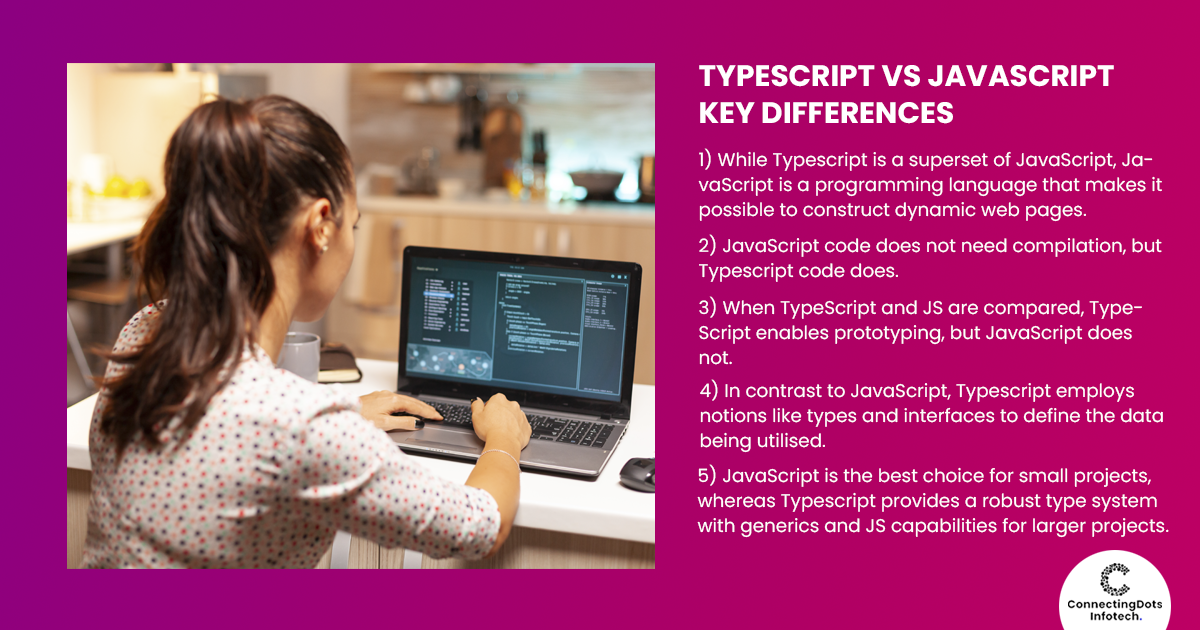TypeScript vs JavaScript: Key Differences

Learn the fundamental differences between TypeScript and JavaScript, along with feature comparisons.
The aspects of both languages will be examined, and we will learn what each language is capable of. Additionally, the lesson would outline the variations between Javascript and Typescript.
What is Typescript?
Microsoft created and maintains the object-oriented programming language known as TypeScript. It adds optional static typing to the language and is a strict superset of JavaScript in terms of syntax.
Large apps are designed to be built with TypeScript (TS), which trans-compiles to JavaScript. JavaScript applications may be created with TypeScript for the client- and server-side execution. Programs written with the popular JavaScript language are likewise legitimate TypeScript programs.
There are several trans-compilation options available. You may use the built-in TypeScript Checker or ask the Babel compiler to convert TypeScript to JavaScript.
Similar to how C++ header files can specify how current object files are constructed, TypeScript supports JS libraries. As though they were TypeScript entities with statically typed values, other applications are now able to use values that are clearly stated in files.
For well-known libraries like D3.js, jQuery, and MongoDB, there exist third-party header files. Additionally available are TypeScript headers for Node.js basic modules, enabling the creation of Node.js programs in TypeScript.
The TypeScript compiler is created using JavaScript and TypeScript. It is licenced according to Apache License 2.0.
TypeScript Features
Static Typing: Programmers that use static typing must explicitly state the type of each variable.
Consider taking the variable str, for instance. The code won't run until you provide it a type, such as whether it's an Integer, Float, List, or anything else. Also statically typed is TypeScript. The Static Typing feature of TypeScript gives the language several benefits, such as earlier mistake detection and quicker code completion.
Compatibility: The best of both realities may be found in TypeScript. It is entirely compatible with all JavaScript versions, including the more recent ES7 and ES12 versions. It can convert the final ES7 code back to ES5 and the other way around. This guarantees easy transitions and the language's portability.
JavaScript Features: TypeScript is a Javascript superset. It also offers more JavaScript features as part of its advanced features. These characteristics include support for JavaScript libraries, system independence, and object-oriented programming principles.
What is JavaScript?
JavaScript, sometimes abbreviated as JS, is a programming language for creating software that uses the ECMAScript syntax. JavaScript is multi-pattern, high-level, and just-in-time compiled.
It has prototype-based object orientation, curly-bracket syntax, variable typing, and first-class functions. JavaScript is one of the fundamental technologies of the World Wide Web, along with CSS and HTML.
JavaScript is a crucial component of web applications and gives dynamic internet pages their strength. All major web browsers have a dedicated JavaScript engine to carry it out, and the majority of websites use it for client-side web page behaviour.
JavaScript is a multi-paradigm coding language that supports functional, event-driven, and imperative programming approaches. For calculating dates, text, common data structures, the Document Object Model (DOM), and regular expressions, it includes an application programming interface (API).
Previously solely used in web browsers, JavaScript engines are now being implemented in certain servers, often using Node.js. JavaScript has various variations, including TypeScript, CoffeeScript, Dart, and Kotlin.
Numerous applications built using frameworks like Cordova and Electron also use them.
JavaScript Features
User Input Validation: JavaScript checks user input for mistakes. In other words, JavaScript accounts for user mistakes like leaving a blank space or providing wrong information while transferring data to the server. The time spent running the code is greatly reduced.
Platform Independent: Since JavaScript is a front-end language that operates in browsers, its platform independence is essential. It is a capability that enables the execution of JavaScript code on several operating systems, including Netscape, Windows, Macintosh, etc.
User’s Browsers and OS: JavaScript has the ability to recognise user operating systems and browsers. In some circumstances, such as when various outputs are anticipated for various browsers, it is crucial.
Client-side Calculations: As a front-end language, JavaScript is capable of doing straightforward front-end computations without repeatedly contacting the server. It assures effectiveness and saves time.
Key Differences
- While Typescript is a superset of JavaScript, JavaScript is a programming language that makes it possible to construct dynamic web pages.
- JavaScript code does not need compilation, but Typescript code does.
- When TypeScript and JS are compared, TypeScript enables prototyping, but JavaScript does not.
- In contrast to JavaScript, Typescript employs notions like types and interfaces to define the data being utilised.
- JavaScript is the best choice for small projects, whereas Typescript provides a robust type system with generics and JS capabilities for larger projects.

Conclusion
Knowing how TypeScript and JavaScript vary from one another, it can be argued that both technologies have benefits and drawbacks.
Despite not being a complete coding language, JavaScript is used in conjunction with HTML to improve the quality of online sites. Additionally, hundreds of skilled engineers write JavaScript code.
On the other side, developers want to write legible, concise, and aesthetically pleasing code like TypeScript. Not to mention the benefits TypeScript provides for static typing and many live error-checking features.
